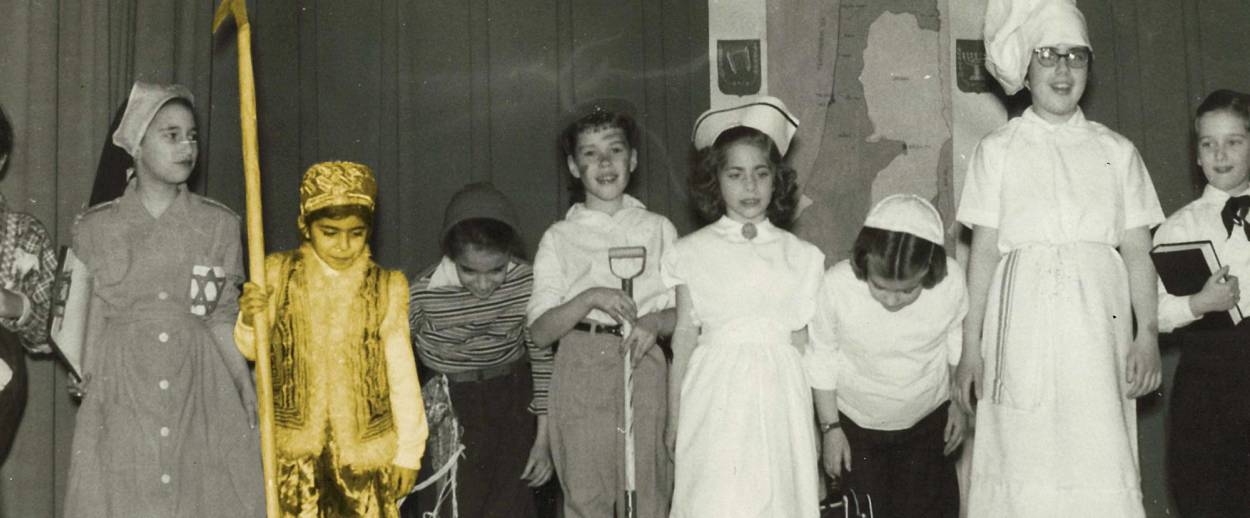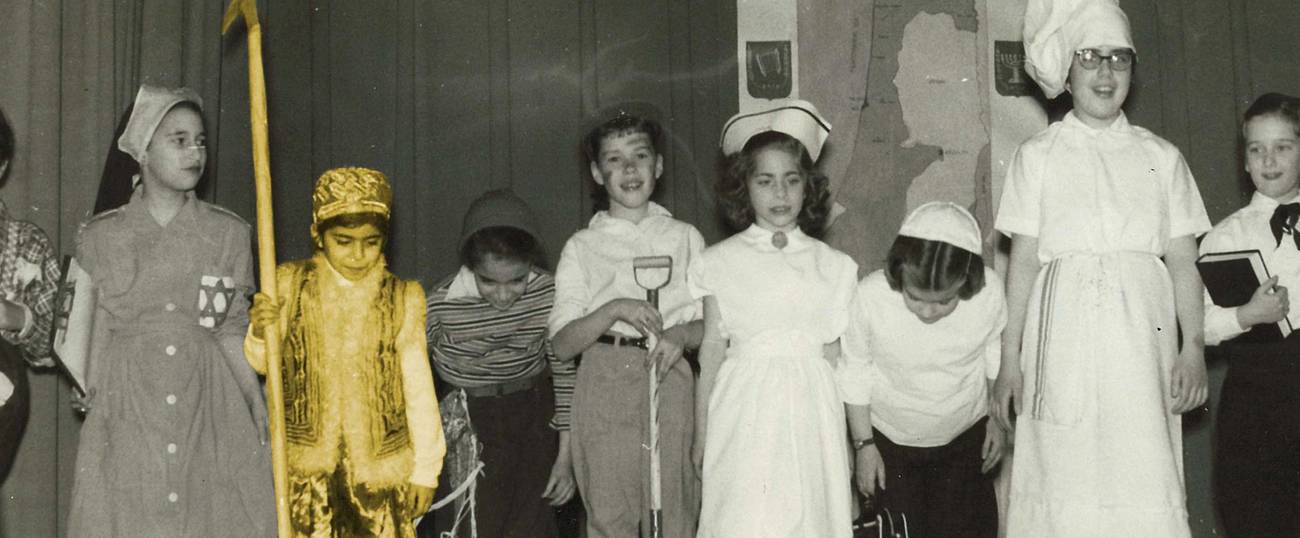A Purim Victory
Growing up in Queens, I tried to hide my Iranian roots. But my mother had other ideas.




Walking through the open streets of Queens with my mother, my face fully exposed, all I wanted to do was hide. Six years old, three feet tall, I was dressed in a pair of silky gold, ballooning pantaloons. My short arms barely protruded from a heavily brocaded sheepskin vest tailored to fit a mountainous, nomadic male. In blackest of black, Mom had penciled my brows and raccooned my eyes. On my head she had mounted a turban to match the vest—stitched with gold and silver coils, thickly banded in sequins, beads, and jingling bells. Satisfied, she had handed me a seven-foot-tall, hooked shepherd’s staff. We were headed to the Adath Jeshurun Synagogue in Kew Gardens, Queens for the Hebrew School’s Purim Costume Competition. Mom had entered me as a Boukharian shepherd.
Purim is a holiday that commemorates the saving of the Jewish people from Haman, a heinous Persian minister who reported to King Ahasuerus (Xerses I). The story is told in Megillat Esther—The Book of Esther. Esther was an orphan who lived with her cousin Mordechai as a concealed Jew in the city of Shushan in the fourth century BCE. When King Xerxes I of Persia saw Esther, he was smitten by her beauty and immediately proclaimed her his Queen. Haman, the King’s evil Prime Minister, hated Jews, and tricked the King into signing a decree stating they all be killed. When Esther learned of this from Mordechai, she courageously approached the King, revealed her true Jewish identity, and pleaded for her people. Swayed by love, Xerxes reversed his decree, and the Jews of Shushan were saved. Esther had heroically risked her life in order to save the lives of her people.
Mom, certain she was a direct descendent of this Queen, claimed the holiday as hers. Not only did she believe her ancestors dated back to the Persian Empire, and not only had she lived as a hidden Jew in Mashhad just as Esther had concealed her Jewishness from King Ahasuerus, but her mother, also named Esther, had died after giving birth, orphaning Mom, just as the Queen had been orphaned. Outspoken and ravishingly beautiful, Mom identified with her heroine, convinced that she, too, would have used her wiles to sway the King, just as Queen Esther had done.
It was the 1950s, a decade committed to conformity and assimilation. Everyone watched The Adventures of Ozzie and Harriet, Father Knows Best, and Lassie. An impenetrable barrier separated those who ate Wonder Bread, Twinkies, and Campbell’s Tomato Soup from those who didn’t; girls who wore poodle skirts, cardigan sweaters, saddle shoes, single-strand pearl necklaces from those who didn’t. If you had darker skin, spoke with a thick accent, drank rose water tea, and ate saffron rice, wore saris and chadors, you were a pariah.
Kids in our neighborhood threw stink bombs at buck teeth, freckled faces, wiry hair—anyone who was different. On my first day of first grade, I wore three Persian gold bangles to school, only to be teased, taunted, reduced to tears by classmates proudly wearing Mickey and Minnie Mouse watches. One white boy with a flattened nose and swollen eyes rubbed my head with both hands and asked if I ate watermelon. I didn’t understand why he was asking but figured it must have something to do with my jingling bracelets. If any of my classmates had heard Mom’s discombobulated English, felt Pop’s stinging stare, heard my parents speak to me in Farsi, I knew I’d be dead meat. And so I didn’t invite other 6-year-olds to our home. Sure, Pop forbade it, but I also knew our home was odd, and odd meant being an outcast. In the school cafeteria, I concealed my green lunchbox packed with Persian spinach patties wrapped in pita bread instead of peanut butter and jelly sandwiches. A total giveaway. Quickly, I learned a never: Never reveal the sounds and smells of Mashhad. If girls in my class knew how different I really was, they’d never again play hopscotch or jump rope with me. This was a fact.
That evening, I quaked as I entered the synagogue in my Boukharian shepherd costume. The musty vest, brought to the States by my mother, reeking of sunbaked manure, smelled like a desert camel. Blanketed beneath layers of fabric, releasing a stench, I withdrew inside myself.
At age 6, I had fantasies of my own and imagined myself dressing up as a woman of valor. Annie Oakley, the sharpshooting cowgirl, was my first pick. The vest, the pantaloons, the spangly turban and shepherd’s staff had nothing to do with me.
Still, I didn’t protest. I didn’t say a word. Talking brought on heavy palpitations and made me sweat. I was nonconfrontational, one might say spineless, but I knew words led to trouble, especially if they angered Mom. She was quick to scream, quick to feel attacked, and quick to counterattack. This holiday of costumes, masks, swinging graggers carried my mother back to her homeland. When I imagined myself saying, “I don’t want to wear your Boukharian shepherd costume,” all my what-ifs crept in: What if she decides that means I don’t love her? What if she decides that means no one loves her? What if she bawls hysterically? What if she runs away? I couldn’t see her as someone who would stay, so I held my tongue.
In the synagogue, my Hebrew school classmates came skipping into the auditorium dressed as doctors, nurses, firemen, policemen, school teachers, ballerinas. As they passed me and my seven-foot-tall shepherd’s staff, their faces contorted.
“Yuk! What are you supposed to be?” They squealed with laughter.
No one but Mom and I knew the answer. Mortified, my cheeks burning, I zipped my lips and gazed enviously at my friends Nancy, Susie, and Amy. Each wore the garments of their future dreams: Nancy was dressed as a school teacher; Susie, as a nurse; and Amy, in a powder-pink tutu, as a ballerina—all New York possibilities, unlike a Boukharian shepherd.
After eating hamantashen and harmonizing in song, my classmates and I were instructed to stand on stage so judges could take a good look at our costumes and decide who would take First Prize and be the lucky winner of a Brownie camera. It sat atop a tall chrome pedestal at one end of the stage. Brownies were a luxury item that my fellow classmates and I never dreamed of owning. We stared at its shiny black and silver face, almost drooling.
Fearful of tripping, I clutched my trailing pantaloons and shut my mouth tight as we filed onto the stage. The jingling band over my brow vigorously announced my presence. No one could miss those bleating bells even if they had somehow missed my towering staff. I stood on stage in costume, feeling unclothed. Our outfits, lit by yellow floodlights, were now blindingly luminous. Standing with my classmates in a single row, I tried to hide behind Susie, proudly dressed as a Red Cross nurse. She looked divinely American: bright white nurse’s uniform, white nurse’s shoes, and a triangular boat-shaped hat stamped with a Red Cross. Her doctor-father’s stethoscope was draped around her neck. In one hand she held a medical prescription pad and in the other a thermometer. Thoroughly authentic, thoroughly in tune with the times. Becoming a doctor was a dream belonging only to boys. Nursing was our female equivalent. Susie came across as a classy, self-assured, 6-year-old career woman. I could see in her upturned face that she knew the coveted Brownie would soon be hers. And so did I.
After clearing his throat, the assistant rabbi reached for the mike. Finding the tension unbearable, I left my body on stage and traveled to a sunny, deserted, tropical island where I felt grains of sand between my toes and a balmy breeze blowing through my loose hair. My jagged breathing settled into a calm rhythm. Leaving my body felt awfully good. Through the sound of crashing waves and the scent of salt air, I still could hear the assistant rabbi speaking. He had collected and tallied the judges’ ballots, and the first-grade Grand Prize winner had been chosen.
The room grew still. Parents huddled, anticipating the moment they could clap and scream with joy.
“Tonight, every first-grader deserves to win,” the rabbi announced in an attempt at reassurance. “You are all wearing such delightful costumes …”
Dozens of children nervously shifted their weight from foot to foot.
“… and each lovely costume adds to the joyful ruach of Purim. …”
Battling stomach cramps, I tuned out the rest.
Through squinting eyes, I vaguely registered parents in the audience half-heartedly applauding. Relieved it was over, my gaze flitted over the crowd and landed on Mom. Her hair glistened like wet coal. She was beaming, clucking, wildly waving her hands in the air. As my eyes latched onto hers, my knees knocked. This had to be a mistake. I had won.
My hyperventilating mother was jumping up and down, as if on a pogo stick, looking like a million-dollar lottery winner. Dressed as a Boukharian shepherd, I felt like the biggest loser of all, but, even so, I bent at the waist and bowed.
“Thank you,” I said, trying with all my heart to mean it.
There were second- and third-place winners, but only the first-place winner took home a camera. Other children in costumes mirroring the American dream were going home empty-handed. Some stomped off stage looking cheated, while others meekly dried their tears with their sleeves. Susie gave me a backhanded wave as she passed by.
“Baa … baa … Go play with your sheep, prizewinner.”
Drunk with success, Mom grabbed my wrist and paraded through the crowd with my camera held high.
Back then I didn’t have the words, but I did feel this was Mom’s triumph, not mine. In some awkward fuzzy way, I knew she was both the 6-year-old child on stage and the 31-year-old mother clapping wildly. Winning, I now know, meant she and her Iranian roots had triumphed, beating all the pedigreed German Jews attending our synagogue. Here, in America, she was not only free to show her face but finally free to win, taking revenge on every educated American mother she felt had scorned her.
I studied Mom’s exuberance as she waved the camera high. While she felt coronated, I felt shamed. At age 6, Annie Oakley galloping over hills and through valleys was my wished-for self, with or without a camera strapped across my chest. But Mom was telling me, No. You don’t know who you should be. I know.
Excerpted from Concealed: Memoir of a Jewish/Iranian Daughter Caught Between the Chador and America by Esther Amini, published by Greenpoint Press, 2020.
Esther Amini is a writer, painter, and psychoanalytic psychotherapist in private practice.